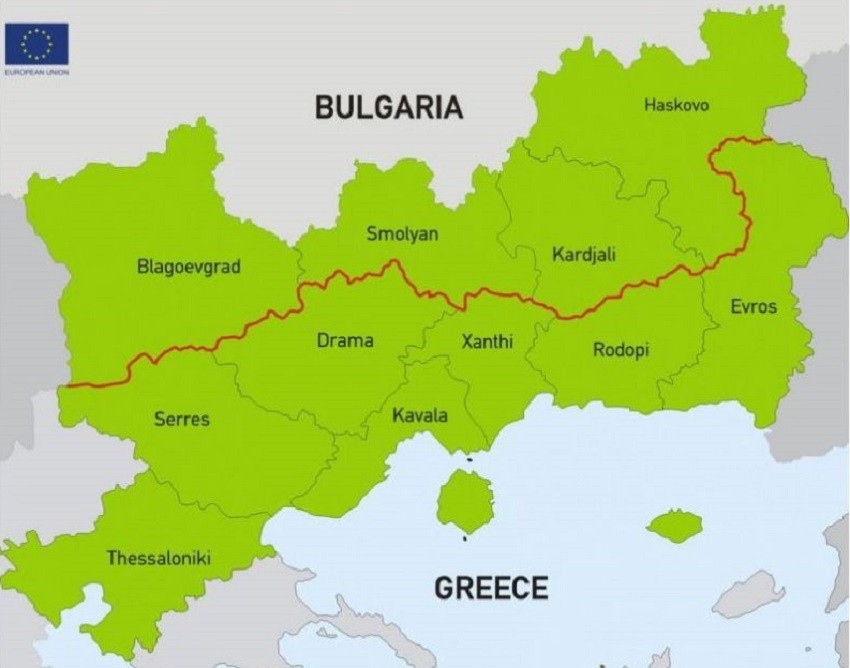Cooperation between Bulgaria and Greece under the European Programme for Cross-border Cooperation Interreg began back in the late 1990’s with the Programme INTERREGI (1990-1993). The Cooperation Programme “Greece-Bulgaria 2014-2020” was approved by the European Commission in 2016. The total financing consists of EUR 110 million (85%) ERDF funding and EUR 19.5 million (15%) national contribution.
The eligible area of the Programme consists of the prefectures of Evros, Kavala, Xanthi, Rodopi, Drama, Thessaloniki and Serres in Greece and the South-Central Planning region and South-West Planning Region (Districts of Blagoevgrad, Smolyan, Kardzhali and Haskovo) in Bulgaria. The Greece-Bulgaria cross border cooperation area for the programming period 2014-2020 is identical to the current European Territorial Cooperation (ETC) Programme. It extends to 40.202 square kilometers and has a total population of 2.7 million inhabitants.

To what extent did the Covid-19 pandemic affect the work on the Bulgaria-Greece Cross-border Cooperation Programme? Dimitrios Papathanasiou, Coordinator of the Joint Secretariat Team of the Cooperation Programme Interreg V-A Greece-Bulgaria told Radio Bulgaria details:
“We are monitoring the implementation of the projects and communicate with the European Commission, Bulgaria’s authorities and the contractors via video conference meetings. Since March 2020, we had to adapt to completely new living and working conditions, in order to protect our health and other peoples’ health. Unfortunately, some of our associates passed away, others fell ill and were absent, which had a psychological impact on us and impeded our practical activities. They include the financing of more than 100 projects that develop competitiveness, innovations and transport corridors, protect the environment and the cultural heritage, help with the social integration and improve healthcare. We pay special attention to projects which aim to protect us from floods and to projects linked with the construction of the new border checkpoint between Bulgaria and Greece – Xanthi-Rudozem.

As for the entrepreneurship section, private projects of Bulgarian and Greek companies selected on a competitive basis were financed for the first time. These are 35 companies which operate mainly in the field of tourism, processing industry, renewable energy and healthcare. Our top priority is to implement the projects in a timely manner and to budget, as well as to prepare the new programming period 2021-2027. It is important for us to organize events to present the results of our activities to the public, but this activity was held mainly online during the Covid-19 pandemic.”
The key European programme INTERREG, which aims to encourage territorial cooperation between regions on either side of the border, has a thirty-year history, but the coronavirus pandemic has postponed some of the events linked with this anniversary. However, in 2021 Bulgaria and Greece are planning some traditional initiatives on both sides of the border.
“We are to participate at this year’s edition of the Thessaloniki International Fair. Hopefully, we will mark the European Cooperation Day (September 21) with traditional races and blood donation campaigns with the participation of Greek and Bulgarian citizens, as well as with parallel events held on both sides of the Bulgaria-Greece border.”
English version: Kostadin Atanasov
Photos: private library
"Flower in a Test Tube" is an innovative project that creates a new product using plant biotechnology. But it does more than that—it tells a story about the power of the human mind and heart. The idea comes from Petar Neftelimov, a young man born with..
The annual growth of incomes outpaced that of expenses in 2024. According to data from the National Statistical Institute, in 2024 the average annual total income per household member in Bulgaria reached 12,857 BGN (6,573.68 EUR) and increased by 18.5%..
The pig meat sector in Bulgaria is showing signs of growth. This was announced at the International Forum "Modern Trends in Pig Farming: Scientific, Market and Regulatory Aspects", held today in Stara Zagora. It was highlighted that 53% of the..
The annual growth of incomes outpaced that of expenses in 2024. According to data from the National Statistical Institute, in 2024 the average annual..
"Flower in a Test Tube" is an innovative project that creates a new product using plant biotechnology. But it does more than that—it tells a story about..

+359 2 9336 661
